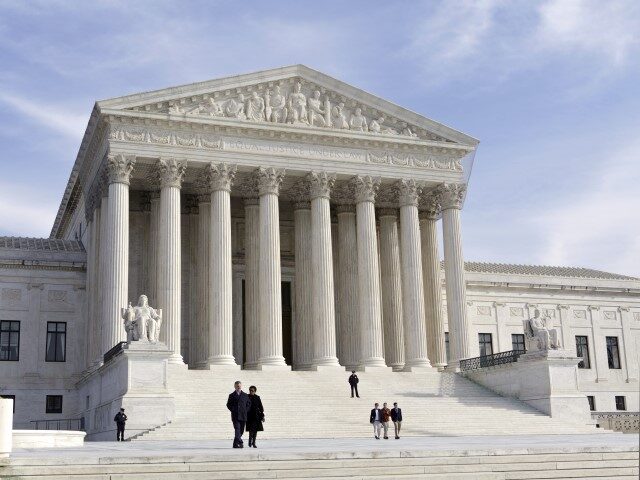WASHINGTON, DC – The Deep State, Second Amendment, Big Tech censorship, and taxes are among the major issues pending before the Supreme Court as the justices begin their annual term Monday, with 34 cases already on the docket. Here is a preview of the big questions facing the court this year.
Perhaps the biggest case so far is one that most Americans have never heard of because it sounds more like a law-geek debate than something that has a tremendous impact on people’s daily lives.
It is Loper Bright Enterprises v. Raimondo, which asks the court to overrule what is called Chevron deference, from a 1984 Supreme Court case, Chevron v. NRDC. That doctrine of deferring to a federal agency’s legal interpretations whenever the law in question is administered by the agency claiming deference, and then allowing such interpretations to have full legal effect so long as they are “reasonable,” has massively expanded the regulatory power of the federal government. The court clerk’s office has not yet set a date for argument in Loper Bright.
On November 7, the justices will decide in United States v. Rahimi whether 18 U.S.C. § 922(g)(8) – which prohibits a person subject to a domestic violence restraining order from possessing a firearm – violates the Second Amendment. This case is complicated by the fact that the person charged under that law also fired a gun at innocent bystanders who had witnessed violent acts he had committed.
Another major pair of cases are Moody v. NetChoice and NetChoice v. Paxton, involving First Amendment challenges to laws from Florida and Texas that regulate social media companies in attempts to combat Big Tech censorship of conservatives and Republicans. Review was granted recently, so an argument date has not yet been set.
Yet another unscheduled major case is Moore v. United States, where the court will tackle the Sixteenth Amendment to the Constitution, which is the provision that authorizes a federal income tax. In Moore, the court will decide whether the government can tax unrealized gains in value. While that is not necessarily a “wealth tax” per se, it certainly breaks ground in that area, with potentially major implications given the creep of wealth redistribution and other forms of socialism and now seen in the Far Left’s agenda, both in the Biden administration and among congressional Democrats.
In addition to those five major cases, there are a number of other important cases already in the court’s docket for decision:
The court’s first week has one such important case. On October 3, it will hear CFPB v. Community Financial Services Association, in which the Fifth Circuit appeals court held that the funding system for the powerful CFPB (Consumer Financial Protection Bureau) – which comes from fees collected by the Federal Reserve – is unconstitutional because only Congress can appropriate money to fund a federal agency.
Later in the term the court will hear another constitutional challenge to part of the administrative state. In SEC v. Jarkesy, the court will decide both whether the SEC’s (Securities and Exchange Commission) enforcement proceedings violate the Seventh Amendment’s right to a jury trial for federal civil matters when at least 20 dollars (that is not a typo) is at stake, and also whether the protection from removal that SEC administrative law judges enjoy violates the Appointments Clause of Article II in the Constitution.
On October 11, there is also Alexander v. South Carolina NAACP, challenging the constitutionality of part of South Carolina’s congressional districting map under the Voting Rights Act.
Then on October 31, in O’Connor-Ratcliff v. Garnier, the court will decide whether a government official is subject to the First Amendment if he blocks an individual from that official’s personal social media account.
There are also a couple immigration cases not yet assigned argument dates. In Wilkinson v. Garland, the justices will decide how high the threshold is for an appeal of claiming “exceptional and extremely unusual hardship” as grounds for canceling deportation. And in Campos-Chavez v. Garland, they will clarify some of the circumstances under which a court can order deportation when an illegal alien is a no-show to his immigration hearing.
In Devillier v. Texas, the court will decide whether citizens can sue under the Fifth Amendment’s Takings Clause when a state takes their property without paying for it even when the legislature has not passed a law allowing for such a lawsuit.
And in FBI v. Fikre, for a person who was placed on the No Fly List by the government but was later taken off it, the justices will decide whether that person can still sue the federal government.
The court is expected to grant review in up to three dozen additional cases for this year in the coming months. The court’s term goes from the first Monday of October until the end of June.
Breitbart News senior legal contributor Ken Klukowski is a lawyer who served in the White House and Justice Department.

COMMENTS
Please let us know if you're having issues with commenting.